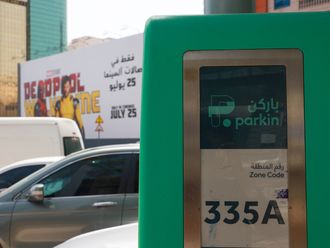Dubai The Palestinian sovereign wealth fund is aiming to boost the private sector and wean the strife-torn region off aid, with investments in sectors such as tourism and power generating profits despite difficult relations with Israel, its boss told Reuters.
While most other, much larger, sovereign wealth funds invest heavily abroad in a bid to spread risk and maximise returns, the Palestine Investment Fund (PIF) is focused on developing the local economy.
"Our objectives differ from that of some sovereign funds elsewhere," the PIF's chief executive, Mohammad Mustafa, said in a telephone interview from his office in Ramallah.
"We want to create jobs, contribute to increasing taxes and build a revenue base for the government. We want to build a Palestinian economy less dependent on the government and less dependent on aid from donors," he said.
The strategy appears to be having some success. The PIF is on track to deliver cumulative net profit of $800 million (Dh2.938 billion) in the decade to 2013, most of which is paid as dividends to the Palestine National Authority.
Mustafa said the fund had achieved strong results in challenging conditions.
"Increasing political risk makes attracting investments more difficult — control by Israel of the natural resources in the region affects business," he said.
He gave the example of telecom operator Wataniya Mobile — launched in 2009 in a venture with Qatar Telecom's Kuwaiti unit Wataniya, saying it faced an initial delay of two years because Israeli authorities would not release spectrum.
Fresh problems
The operator is facing fresh problems in Gaza, with its equipment lying in storage for the past six months, he said.
Mustafa said PIF made a net profit of $33 million in 2011, down from $59 million a year earlier, when it had made profits on the sale of some of its assets.
"As a fund we operate on a cycle of ten years — by the end of 2013, we estimate we would have made cumulatively $800 million in profit and distributed $700 million in dividends, a return of 15 per cent per year," he said.
"Our main shareholder, the Palestine [National] Authority, needed us to pay higher dividends in 2006, 2007 and 2008 and now we're trying to moderate that."
The political imperatives of the funds are evident from investments such as the one in an economic empowerment programme for Palestinian refugees in Lebanon.
The 58-year-old Mustafa, a Palestinian with a doctorate in management and economics and a degree in engineering, came to PIF after 15 years at the World Bank.
He said that in the last five years the fund's investments helped create 10,000 jobs.
Real estate, which contributes 15 per cent to the Palestinian economy, is a major sector for the fund, and in the hospitality business, it has stakes in the Grand Park hotel in Ramallah and the Intercontinental in Jericho.
In the power sector, investments include the Palestine Electric Company and a power station in the northern West Bank.
The small and medium-sized enterprise sector is also an area of focus for the fund.
Recently, PIF linked up with Dubai-based Abraaj Capital, the region's biggest private equity fund, US technology firm Cisco, Bank of Palestine and the European Investment Bank to set up the Palestine Growth Capital Fund, with plans to invest and help manage SMEs in the Palestinian territories.
Mustafa said the Growth Capital Fund, which raised $36 million from investors in a first round of funding, targeted raising $100 million in three years.
PIF has invested $15 million in another fund, set up by investment bank Rasmala. Mustafa said the target with this fund was similar — to boost its size to $100 million in three years from $38 million currently.
Started with $570m
Palestine Investment Fund (PIF) was formed with assets of $570 million (Dh2.093 billion) in 2003, transferred to it from the Palestine National Authority after a valuation exercise by international auditors in coordination with the International Monetary Fund and the World Bank. Its assets under management as at end-2010 were $868 million.
While most sovereign funds depend on their governments for cash, often from exports of oil, the PIF has been a source of revenue to the Palestine National Authority.
"It's been a one-way relationship, as our objectives differ from that of some sovereign funds elsewhere," said Mustafa.











